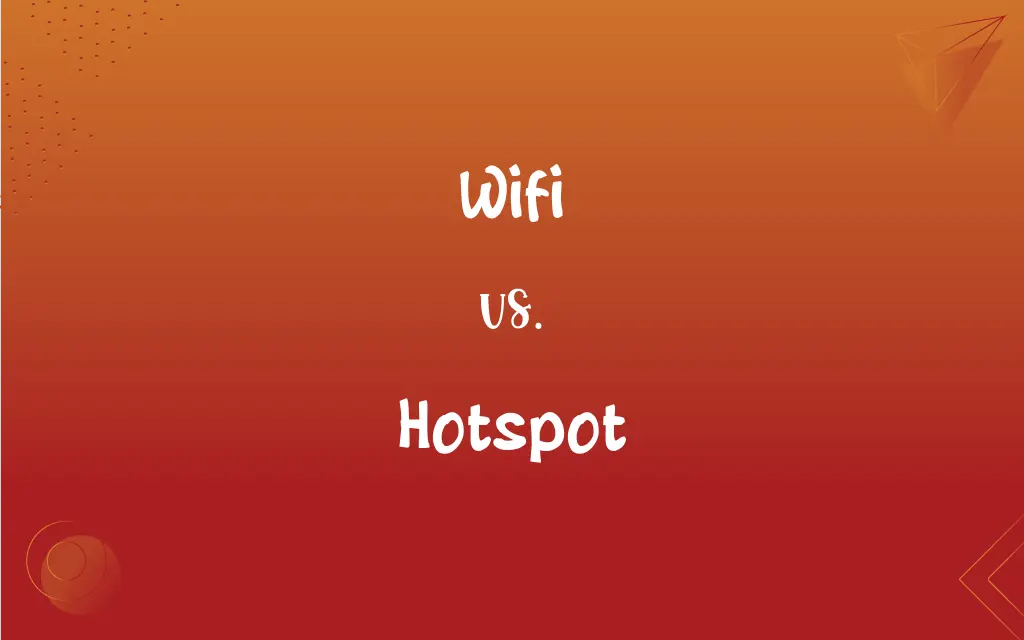WiFi vs. Hotspot: What's the Difference?
Edited by Janet White || By Harlon Moss || Updated on October 11, 2023
WiFi refers wireless communication technology that allows devices to connect to a local network. A hotspot is a localized area with an accessible wireless internet connection, typically created using a portable device or a feature on a smartphone.

Key Differences
WiFi represents a technology facilitating wireless internet access. Hotspot, conversely, is a site or area where WiFi is available. WiFi enables devices to connect to the internet wirelessly, thereby eliminating the need for physical cables. Contrarily, a hotspot provides a geographical area where this wireless internet can be utilized, essentially serving as an access point for WiFi.
The term WiFi is often misconstrued as an abbreviation, but it simply signifies wireless fidelity, showcasing a mechanism that allows electronic devices to exchange data wirelessly over a computer network. In contrast, a hotspot might be public or private, with public hotspots typically being found in cafes, libraries, and airports, providing WiFi accessibility to people within that locale.
WiFi is generally facilitated through a router that transmits internet signals to devices within a certain range. On the other hand, a hotspot takes this WiFi and delivers it to a particular locale or space, hence forming an access point where devices can connect to the internet, which might be secured with a password or left open for public use.
Security is a pivotal aspect for both WiFi and hotspots. WiFi networks demand secure configurations, including password protection and encryption, to safeguard user data. Hotspots, albeit offering convenient internet access, can potentially expose connected devices to security vulnerabilities, and hence, users are often cautioned about using public hotspots for sensitive transactions.
The ubiquity of WiFi has led to a proliferation of hotspots around the world. While WiFi keeps evolving with enhanced speed and security features, hotspots have become invaluable in providing internet access to people on the go, especially in areas where cellular data is inaccessible or prohibitively expensive.
ADVERTISEMENT
Comparison Chart
Definition
A wireless technology for internet access.
A location providing access to WiFi internet.
Purpose
To enable wireless internet connectivity.
To offer internet connectivity in a specific location.
Accessibility
Available to devices within range of a router.
Available to devices within a specific location or area.
Security Concerns
Needs secure setup to protect data.
Might expose users to vulnerabilities in public settings.
Usage
Used in various settings (home, office, public places).
Often used in public areas to provide internet access.
ADVERTISEMENT
WiFi and Hotspot Definitions
Wifi
WiFi enables data exchange over a computer network without corded connections.
I prefer using WiFi to avoid entangling cables around my workspace.
Hotspot
Some hotspots can enable multiple devices to connect to the internet simultaneously.
The hotel’s hotspot allows guests from various rooms to browse the internet at the same time.
Wifi
It allows internet connectivity to various devices like computers, smartphones, and tablets.
With WiFi, I can use my tablet to browse recipes while cooking.
Hotspot
A hotspot provides wireless internet access to devices in its vicinity.
Many coffee shops offer a free hotspot for customers to use while enjoying their beverages.
Wifi
WiFi is a wireless networking technology that allows devices to connect to the internet.
My phone automatically connects to the home WiFi when I get back from work.
Hotspot
Hotspots can be open or secured, with secured hotspots requiring a password for access.
For security reasons, the company’s hotspot is secured and only accessible to employees.
Wifi
WiFi networks can be secured with passwords and encryption to protect data.
Ensure to set a strong password for your WiFi to prevent unauthorized access.
Hotspot
Hotspots can be created using a device that shares its internet connection with others.
Sarah created a mobile hotspot with her phone to give her tablet internet access at the park.
Wifi
WiFi facilitates internet access within a specific range, typically around 20-100 meters indoors.
The WiFi signal becomes weak in the garden since it's far from the router.
Hotspot
An area in which there is dangerous unrest or hostile action
"opportunities ... for United Nations forces to play a constructive role in some of the world's hot spots" (Paul Lewis).
Wifi
Alternative form of Wi-Fi
Hotspot
(Informal) A lively and popular place, such as a nightclub.
Wifi
Alternative form of Wi-Fi
Hotspot
An area of intense heat, radiation, or activity.
Wifi
A local area network that uses high frequency radio signals to transmit and receive data over distances of a few hundred feet; uses ethernet protocol
Hotspot
A location where Wi-Fi is publicly available.
Hotspot
Alternative form of hot spot
Hotspot
A place of political unrest and potential violence;
The United States cannot police all of the world's hot spots
Hotspot
A point of intense heat or radiation
Hotspot
A lively entertainment spot
Hotspot
It can be a physical location where WiFi access is available to the public or private network users.
The library has become a popular hotspot due to its fast and free internet access.
FAQs
Can WiFi work without internet?
Yes, WiFi can work without an internet connection, enabling local network communication between devices.
Is a hotspot the same as WiFi?
No, WiFi is a technology that allows wireless internet access, while a hotspot is a location or device providing WiFi access.
Does using a hotspot cost money?
Depending on your mobile plan, using your phone as a hotspot may incur additional charges.
What is a WiFi extender?
A WiFi extender boosts the WiFi signal, enhancing its range and strength in your space.
Can I create a hotspot without using mobile data?
Yes, you can create a hotspot to share an existing wireless network without utilizing mobile data.
What is a mobile hotspot?
A mobile hotspot allows a device, often a smartphone, to share its cellular data connection with other devices.
Why does my WiFi keep disconnecting?
Reasons may include signal interference, outdated drivers, or issues with your device or router.
Is it safe to use public hotspots?
Public hotspots can present security risks; avoid accessing sensitive information when connected to them.
Can a hotspot work without WiFi?
Yes, mobile hotspots often work by using cellular data to provide internet access.
How secure is using a hotspot for browsing?
Private hotspots are generally secure, but using a VPN is recommended for additional security, especially on public hotspots.
Why is my WiFi connection slow?
Various reasons like distance from the router, interference, or bandwidth congestion can slow WiFi.
How far can a WiFi signal reach?
Typically, a WiFi signal can reach up to 150 feet indoors and 300 feet outdoors.
How can I improve my WiFi speed?
Position your router centrally, remove obstructions, use the right frequency band, and consider a mesh network.
Can I connect my smart TV to a hotspot?
Yes, most smart TVs allow you to connect to a mobile hotspot for internet access.
How do I troubleshoot a hotspot that's not working?
Ensure the device providing the hotspot has a stable internet connection, reboot it, and check settings or consult your service provider.
What does WiFi stand for?
WiFi doesn’t stand for anything; it is not an acronym but a trademarked term.
How can I make my WiFi network secure?
Utilize a strong, unique password, enable WPA3 encryption, and regularly update your router’s firmware.
Can I use a hotspot abroad?
Yes, but be aware of potential roaming charges and consider using local data SIM cards instead.
Is there a limit to devices connecting to a hotspot?
Limits can exist, often determined by the hotspot device or service provider.
Can I have multiple hotspots in one location?
Yes, multiple hotspots can coexist, although proper setup is needed to avoid interference.
About Author
Written by
Harlon MossHarlon is a seasoned quality moderator and accomplished content writer for Difference Wiki. An alumnus of the prestigious University of California, he earned his degree in Computer Science. Leveraging his academic background, Harlon brings a meticulous and informed perspective to his work, ensuring content accuracy and excellence.
Edited by
Janet WhiteJanet White has been an esteemed writer and blogger for Difference Wiki. Holding a Master's degree in Science and Medical Journalism from the prestigious Boston University, she has consistently demonstrated her expertise and passion for her field. When she's not immersed in her work, Janet relishes her time exercising, delving into a good book, and cherishing moments with friends and family.































































